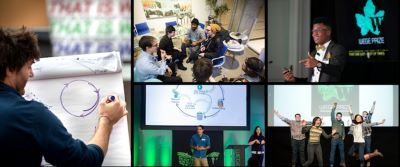Wege Prize has announced a larger and more diverse pool of judges than ever before, promising to help students advance their game-changing concepts for a sustainable future.
Making its acclaimed global competition even better, its 12th edition will include five more Preliminary Judges, bringing the total to 15. This group of professionals works to assist students in refining and improving their product or service concepts and presentations, which address some of the world’s thorniest challenges – from hunger and pollution to wasted resources and homelessness.
This year, a precedent-setting applicant group of 130 five-person teams worldwide were narrowed down to 90 teams for Phase 1, the largest pool of participants in Wege Prize’s 12-year history, to compete in the international student competition for circular innovation. In all, the 90 collaborating teams represent 450 students hailing from 31 countries, including 164 academic disciplines from 144 academic institutions in 41 countries. According to Wege Prize lead Gayle DeBruyn, the preliminary judging panel brings together regional, multidisciplinary experts, who will provide valuable feedback and expertise to these teams, advancing a selection of around 30 teams to Phase 2.
Newly added to Wege Prize’s expanded, 15-person panel of Preliminary Judges, says DeBruyn, are:
– Yumiko Jakobcic, Ph.D., Director of Grand Valley State University’s Office of Sustainability Practices
– Fernando Ramirez, co-founder and designer of Common Object Studio
– Audrey Whaling, program manager for the Emerging Lansing 2030 District
– Deborah M. Steketee, Ph.D., Professor Emerita of Sustainable Business at Aquinas College
– Milinda Ysasi, CEO of Grow, and the City of Grand Rapids’ 2ndward Commissioner.
These five specialists add to the 10 current Preliminary Judges, as well as the Core Judges, who are also leading experts that hail from Europe, South America and the United States.

Image Courtesy of: Wege Prize
Organized by Kendall College of Art and Design of Ferris State University (KCAD), Wege Prize invites dedicated college students from around the globe to collaboratively design innovative solutions to the world’s “wicked problems.” From hunger and pollution to waste and climate, the student teams’ real-world concepts advance innovative, change-making solutions that support the future circular economy.
Along with the Preliminary Judges, Wege Prize’s global panel of Core Judges round out the competition’s diverse and distinguished experts. This year, the core group is joined by
Skot Welch, Principal/Founder of Global Bridgebuilders (GBB), an international firm focusing on organizational development, cultural transformation and inclusion. Details on all the judges and their bios can be found at
www.wegeprize.org/judges.
In addition to Skot, the Core Judges roster includes:
- Tom Newhouse of Mich., design pioneer of Mich.
- Alysia Garmulewicz of Chili, circular economy professor and Co-CEO of Materiom
- Meritxell Martín i Pardo of Spain, circular economy and learning consultant
- Christopher Carter of Fla., educator, animator, and a nationally known sculptor
- Nathan Shedroff of Calif., professor, entrepreneur, business strategist, author, and speaker
- Braj Kishore (BK) Singh of Costa Rica, agriculture, natural resources consultant and co-founder of Green Roots Consultants
- Bill Stough of Mich., strategic management consultant and business owner
- Colin Webster of the United Kingdom, learning content manager with the Ellen MacArthur
- Jo Williams of the United Kingdom, circular economy learning consultant
When the seven-month competition moves into its second phase, Wege Prize’s Core Judges will guide the remaining five-person teams as they work to advance through the four-phase competition by refining their innovative concepts into authentic uses that support the circular economy. The core judges’ subsequent selection of 15 semi-finalist teams in January will be followed by five chosen finalist teams in March, who will present their completed concepts in May, live, for the judging panel as they vie for Wege Prize’s top spot and $30,000 USD. Second and third place teams will earn $20,000 and $10,000, respectively, with each of the two remaining finalist teams receiving $2,500 for their inventive concepts.
England-based core judge Jo Williams says the circular economy isn’t about tweaking the linear economy, but about embracing a completely different system where materials and capital are continually circulated. “What the circular economy offers… is a different way of creating profit,” says Williams. “And in doing so, it also creates a different way or recognizes, that the system we live in is equally important, so we’ve got to look at value in a broader sense.”
To date, more than 1,750 students have participated in Wege Prize, helping promote the circular economy among the multidisciplinary, cultural, and institutional participants, with the competition’s top teams winning more than $435,000 in total cash awards during the past 11 competitions. Many teams have progressed insights gleaned through Wege Prize’s judges though incubator hubs and private business models, furthering real-world solutions to environmental, energy, waste, hunger, agricultural and other challenges.
“The dynamic synergy between Wege Prize’s student teams and the competition’s expert judges creates pathways that move the inventive concepts into workable solutions that support a circular economy,” says Gayle DeBruyn, KCAD professor and Wege Prize organizer. “As more student teams come together for Wege Prize, our larger judging panel ensures that every team’s inventive solution is considered with absolute attention to each aspect of the product or service’s design and how it advances the circular economy, sustainable business operations, and the natural environment.”
About Wege Prize
Wege Prize, a West Michigan-born concept, developed by the Kendall College of Art and Design of Ferris State University (KCAD) Wege Center for Sustainable Design with the support of The Wege Foundation, is an annual competition that ignites games-changing solutions for the future by inspiring college students around the world to collaborate across institutional, disciplinary, and cultural boundaries and redesign the way economies work.
About KCAD
Located in the heart of downtown Grand Rapids, Kendall College of Art and Design of Ferris State University (KCAD) is committed to creating lasting impact in West Michigan and beyond through collaborative partnerships, cultural innovation, and an educational model that prepares students for
leadership in design, the visual arts, and art history; provides innovative, collaborative education that fosters intellectual growth and individual creativity; and promotes the ethical and civic responsibilities of artists and designers, locally and globally. Visit
kcad.edu.
About The Wege Foundation
Planting seeds that develop leaders in economicology, health, education, and arts, and enhance the lives of people in West Michigan and around the world. For more information, please visit
wegefoundation.com.
Feature Image Courtesy of: Wege Prize













